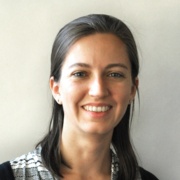Adele Igel, Assistant Professor, University of California, Davis

Please include details about your educational background and what sparked your interest in atmospheric or related sciences.
Like many others, I was fascinated by the weather as a child. I went to college to pursue a degree in meteorology, but quickly realized that weather forecasting was not for me. I was much more drawn to the physics of the weather and ended up double-majoring in meteorology and physics before going on to earn a PhD in atmospheric science.
What was your first job in the field and how did you end up in the job you are in now?
I first had a volunteer position at an NWS forecast office and then a number of undergraduate research internships. Those internships were really important for understanding what aspects of research I was and was not interested in. After my PhD I stayed at my graduate institution for a postdoc position but was lucky enough to be hired in my current position within a few months of graduation.
What opportunities did you pursue that you knew would be beneficial to securing a job in the profession?
I tried to take advantage of any opportunity that came my way. I applied for graduate fellowships and won one - that was especially useful because it allowed me to be more independent in my graduate work than I would have been otherwise. I also took a funded opportunity to spend three months at another university working on a totally separate project from my dissertation. That helped me to expand my research breadth. And finally I tried to go to as many meetings as I could and to fund them by applying for travel grants or serving as a student volunteer.
What other courses/skills beyond the required math and science courses do you think would be the most helpful to individuals wanting a career in your profession?
Programming of any kind if you are generally interested in a career in research. Python, MATLAB, Fortran, R ... these are indispensable for doing data analysis in my day-to-day research.
What is your typical day on the job like?
I'm not sure I have a typical day and that's something that I like about the job. Some days I am teaching and preparing lecture material. Other days I am meeting with my graduate students and working on my own research project. Or I am writing a new grant proposal or a paper. Or I am doing administrative tasks for the university. I love that there is variety.
What do you like most about your job? What is the most challenging thing about your job?
I most like the research and interacting with students. Writing proposals and making sure that I have enough funding to support my graduate students is one of the most stressful parts.
Does your job allow for a good work/life balance? If not, why?
I try to make sure that I have work/life balance. I have young kids and I don't want to be working on the weekends. So far I've managed to do that most of the time, but it is challenging to make sure that I don't give myself more work than I can handle. There is always more work to do and so setting realistic expectations for yourself is important.
Over the course of your career what is the most exciting thing that has happened to you?
The most surprising and exciting thing has been all of the international travel I've been able to do. I've been to the Indian Ocean, Thailand, South Korea, Sweden, the UK, Austria and many more places all associated with research. I didn't expect it when I decided to pursue a career in research and it's been a very rewarding surprise.
Is there anything you wish you had done differently in your career?
Not yet.
What are some ‘must haves’’ on a resume if a person wants to gain employment in your field?
Evidence of high quality independent research, evidence of the ability to attract funding and evidence of teaching ability are all important.